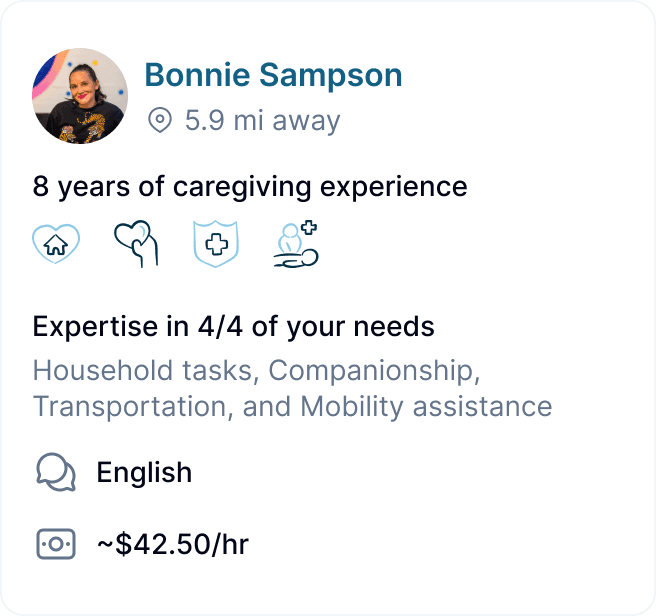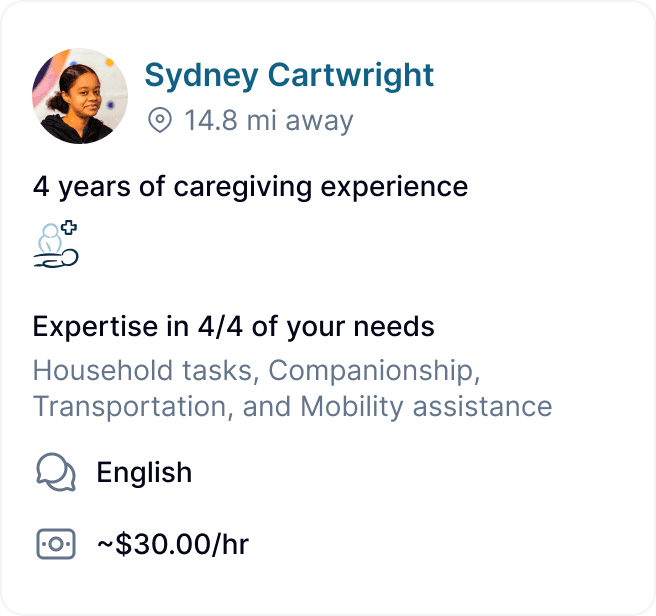How to Vet an Independent Caregiver Without an Agency



Hiring an independent caregiver can be a cost-effective and flexible solution for families seeking personalized home care for a loved one. However, without the support and oversight of a home care agency, the responsibility for vetting, hiring, and managing the caregiver falls entirely on you.
This process requires diligence, organization, and a thorough understanding of best practices to ensure the safety, well-being, and satisfaction of the care recipient. Below is a comprehensive, step-by-step guide to vetting an independent caregiver without the help of an agency.
1. Identify Your Needs
Before beginning your search, clearly define what you need:
Type of Care: Is the primary need medical care, personal care (bathing, dressing, hygiene), companionship, or a combination?
Schedule: Will care be needed full-time, part-time, overnight, or live-in?
Special Requirements: Consider whether the caregiver needs experience with dementia, mobility assistance, or specific medical conditions.
A clear understanding of your needs will help you write an effective job description and identify the right candidates.
2. Create a Detailed Job Description
A well-written job description should outline:
Duties and responsibilities (e.g., meal preparation, medication reminders, transportation)
Required qualifications and certifications (e.g., CPR, First Aid, CNA)
Work schedule and location
Compensation and benefits
Any special skills or language requirements.
This document will serve as the foundation for your search and help set expectations from the start.
3. Find Candidates
There are several ways to find independent caregivers:
Word of Mouth: Ask friends, neighbors, healthcare providers, or local senior centers for recommendations.
Online Job Boards: Post your job description on platforms like Care.com, Craigslist, or local community boards.
Local Resources: Contact your Area Agency on Aging or community organizations for referrals.
Always use trusted sources and be cautious with online responses. This is where finding a high-quality, reliable independent caregiver can become challenging.
4. Screen Applications and Resumes
When reviewing applications:
Look for relevant experience, certifications, and consistent work history.
Check for gaps in employment or frequent job changes, which may warrant further inquiry.
Prioritize candidates with positive references and experience with similar care needs.
5. Conduct Thorough Interviews
Prepare a list of questions that address:
Previous caregiving experience and specific duties performed
Approach to challenging situations (e.g., medical emergencies, behavioral issues)
Communication style and philosophy of care
Availability and flexibility
Assess not only the candidate’s skills but also their personality and compatibility with the care recipient. A trial meeting between the candidate and your loved one can be invaluable.
6. Check References
Always contact at least two or three references, preferably former employers or families:
Ask about reliability, punctuality, and the quality of care provided.
Inquire about how the caregiver handled difficult situations or emergencies.
Confirm the caregiver’s strengths and any areas for improvement.
References can provide insights that aren’t apparent from interviews alone.
7. Run Comprehensive Background Checks
A background check is critical for safety and peace of mind. This should include:
Criminal Record Check: Use your local police department or a reputable online service. Note that police checks are often more thorough than commercial background checks.
Sex Offender Registry Search: Ensure the candidate is not listed.
Abuse and Neglect Registry Search: Some states maintain registries of individuals with substantiated abuse or neglect allegations.
Driving Record Check: If the caregiver will be providing transportation.
Professional License Verification: If applicable, verify certifications or licenses.
You must obtain the candidate’s written consent before running these checks, as required by law.
8. Verify Credentials and Certifications
If the caregiver claims to have specific certifications (such as CNA, HHA, CPR, or First Aid), ask for original documents and verify them with the issuing organization. Some platforms will vet credentials for you, but if not, take the extra step to confirm authenticity.
9. Consider a Trial Period
Before making a long-term commitment, arrange a paid trial period (a few days to a week):
Observe the caregiver’s interactions with the care recipient.
Assess punctuality, professionalism, and adaptability.
Solicit feedback from your loved one and monitor for any concerns.
A trial period helps ensure a good fit and allows both parties to adjust expectations.
10. Draft a Written Employment Contract
A contract should clearly outline:
Duties and responsibilities
Work schedule and pay rate
Overtime, holidays, and time-off policies
Confidentiality and privacy expectations
Termination conditions and notice requirements
Both parties should sign the contract, and each should keep a copy for reference. Read here for more on why proper contracts are important for directly employing domestic workers, like caregivers.
11. Understand Your Legal and Financial Responsibilities
When hiring an independent caregiver, you become an employer, which comes with several responsibilities:
Payroll and Taxes: If you pay more than $2,700 per year (2024 threshold), you must comply with IRS rules for household employees, including withholding and paying Social Security, Medicare, and unemployment taxes.
Worker’s Compensation and Liability Insurance: Consider obtaining insurance to protect against accidents or injuries.
Compliance with Labor Laws: Familiarize yourself with local and state employment laws regarding minimum wage, overtime, and termination.
Consult a tax professional or payroll service if you are unsure about these requirements. See Clara's article on Payroll and Compliance for Care in California here.
12. Ongoing Monitoring and Evaluation
Regularly check in with both the caregiver and care recipient.
Address any concerns promptly and document incidents or feedback.
Schedule periodic reviews to discuss performance and make adjustments as needed.
Maintaining open communication helps ensure a positive and safe care environment for everyone.
Clara: Making Discovering, Hiring, and Managing Caregivers Easier
Vetting an independent caregiver on your own is a significant undertaking, but platforms like Clara Home Care can dramatically simplify the process while maintaining the flexibility and cost savings of hiring independently.
Clara connects families with a network of more than 1,000 vetted and experienced caregivers, offering a modern alternative to traditional agencies. Clara accepts only the top candidatesfewer than 50% of applicants pass their rigorous screening. Each caregiver undergoes a 23-point digital interview, a 7-point background check, and certification verification, ensuring that only qualified professionals are available for hire.
Clara also supports payroll and compliance for in-home care, including payroll, taxes, and liability insurance, so you avoid the administrative and legal headaches that come with being a direct employer.
By leveraging Clara’s infrastructure, you can bypass the most time-consuming and stressful parts of the vetting process-like background checks, credential verification, and legal compliance-while retaining the flexibility and cost-effectiveness of hiring independently. This hybrid approach offers the best of both worlds: the control and personalization of private hire, with the safety, support, and efficiency of a trusted care platform.
Thinking about hiring a caregiver for your loved one? Contact a Clara Care Expert today to learn more about how we can help.
Hiring an independent caregiver can be a cost-effective and flexible solution for families seeking personalized home care for a loved one. However, without the support and oversight of a home care agency, the responsibility for vetting, hiring, and managing the caregiver falls entirely on you.
This process requires diligence, organization, and a thorough understanding of best practices to ensure the safety, well-being, and satisfaction of the care recipient. Below is a comprehensive, step-by-step guide to vetting an independent caregiver without the help of an agency.
1. Identify Your Needs
Before beginning your search, clearly define what you need:
Type of Care: Is the primary need medical care, personal care (bathing, dressing, hygiene), companionship, or a combination?
Schedule: Will care be needed full-time, part-time, overnight, or live-in?
Special Requirements: Consider whether the caregiver needs experience with dementia, mobility assistance, or specific medical conditions.
A clear understanding of your needs will help you write an effective job description and identify the right candidates.
2. Create a Detailed Job Description
A well-written job description should outline:
Duties and responsibilities (e.g., meal preparation, medication reminders, transportation)
Required qualifications and certifications (e.g., CPR, First Aid, CNA)
Work schedule and location
Compensation and benefits
Any special skills or language requirements.
This document will serve as the foundation for your search and help set expectations from the start.
3. Find Candidates
There are several ways to find independent caregivers:
Word of Mouth: Ask friends, neighbors, healthcare providers, or local senior centers for recommendations.
Online Job Boards: Post your job description on platforms like Care.com, Craigslist, or local community boards.
Local Resources: Contact your Area Agency on Aging or community organizations for referrals.
Always use trusted sources and be cautious with online responses. This is where finding a high-quality, reliable independent caregiver can become challenging.
4. Screen Applications and Resumes
When reviewing applications:
Look for relevant experience, certifications, and consistent work history.
Check for gaps in employment or frequent job changes, which may warrant further inquiry.
Prioritize candidates with positive references and experience with similar care needs.
5. Conduct Thorough Interviews
Prepare a list of questions that address:
Previous caregiving experience and specific duties performed
Approach to challenging situations (e.g., medical emergencies, behavioral issues)
Communication style and philosophy of care
Availability and flexibility
Assess not only the candidate’s skills but also their personality and compatibility with the care recipient. A trial meeting between the candidate and your loved one can be invaluable.
6. Check References
Always contact at least two or three references, preferably former employers or families:
Ask about reliability, punctuality, and the quality of care provided.
Inquire about how the caregiver handled difficult situations or emergencies.
Confirm the caregiver’s strengths and any areas for improvement.
References can provide insights that aren’t apparent from interviews alone.
7. Run Comprehensive Background Checks
A background check is critical for safety and peace of mind. This should include:
Criminal Record Check: Use your local police department or a reputable online service. Note that police checks are often more thorough than commercial background checks.
Sex Offender Registry Search: Ensure the candidate is not listed.
Abuse and Neglect Registry Search: Some states maintain registries of individuals with substantiated abuse or neglect allegations.
Driving Record Check: If the caregiver will be providing transportation.
Professional License Verification: If applicable, verify certifications or licenses.
You must obtain the candidate’s written consent before running these checks, as required by law.
8. Verify Credentials and Certifications
If the caregiver claims to have specific certifications (such as CNA, HHA, CPR, or First Aid), ask for original documents and verify them with the issuing organization. Some platforms will vet credentials for you, but if not, take the extra step to confirm authenticity.
9. Consider a Trial Period
Before making a long-term commitment, arrange a paid trial period (a few days to a week):
Observe the caregiver’s interactions with the care recipient.
Assess punctuality, professionalism, and adaptability.
Solicit feedback from your loved one and monitor for any concerns.
A trial period helps ensure a good fit and allows both parties to adjust expectations.
10. Draft a Written Employment Contract
A contract should clearly outline:
Duties and responsibilities
Work schedule and pay rate
Overtime, holidays, and time-off policies
Confidentiality and privacy expectations
Termination conditions and notice requirements
Both parties should sign the contract, and each should keep a copy for reference. Read here for more on why proper contracts are important for directly employing domestic workers, like caregivers.
11. Understand Your Legal and Financial Responsibilities
When hiring an independent caregiver, you become an employer, which comes with several responsibilities:
Payroll and Taxes: If you pay more than $2,700 per year (2024 threshold), you must comply with IRS rules for household employees, including withholding and paying Social Security, Medicare, and unemployment taxes.
Worker’s Compensation and Liability Insurance: Consider obtaining insurance to protect against accidents or injuries.
Compliance with Labor Laws: Familiarize yourself with local and state employment laws regarding minimum wage, overtime, and termination.
Consult a tax professional or payroll service if you are unsure about these requirements. See Clara's article on Payroll and Compliance for Care in California here.
12. Ongoing Monitoring and Evaluation
Regularly check in with both the caregiver and care recipient.
Address any concerns promptly and document incidents or feedback.
Schedule periodic reviews to discuss performance and make adjustments as needed.
Maintaining open communication helps ensure a positive and safe care environment for everyone.
Clara: Making Discovering, Hiring, and Managing Caregivers Easier
Vetting an independent caregiver on your own is a significant undertaking, but platforms like Clara Home Care can dramatically simplify the process while maintaining the flexibility and cost savings of hiring independently.
Clara connects families with a network of more than 1,000 vetted and experienced caregivers, offering a modern alternative to traditional agencies. Clara accepts only the top candidatesfewer than 50% of applicants pass their rigorous screening. Each caregiver undergoes a 23-point digital interview, a 7-point background check, and certification verification, ensuring that only qualified professionals are available for hire.
Clara also supports payroll and compliance for in-home care, including payroll, taxes, and liability insurance, so you avoid the administrative and legal headaches that come with being a direct employer.
By leveraging Clara’s infrastructure, you can bypass the most time-consuming and stressful parts of the vetting process-like background checks, credential verification, and legal compliance-while retaining the flexibility and cost-effectiveness of hiring independently. This hybrid approach offers the best of both worlds: the control and personalization of private hire, with the safety, support, and efficiency of a trusted care platform.
Thinking about hiring a caregiver for your loved one? Contact a Clara Care Expert today to learn more about how we can help.
Hiring an independent caregiver can be a cost-effective and flexible solution for families seeking personalized home care for a loved one. However, without the support and oversight of a home care agency, the responsibility for vetting, hiring, and managing the caregiver falls entirely on you.
This process requires diligence, organization, and a thorough understanding of best practices to ensure the safety, well-being, and satisfaction of the care recipient. Below is a comprehensive, step-by-step guide to vetting an independent caregiver without the help of an agency.
1. Identify Your Needs
Before beginning your search, clearly define what you need:
Type of Care: Is the primary need medical care, personal care (bathing, dressing, hygiene), companionship, or a combination?
Schedule: Will care be needed full-time, part-time, overnight, or live-in?
Special Requirements: Consider whether the caregiver needs experience with dementia, mobility assistance, or specific medical conditions.
A clear understanding of your needs will help you write an effective job description and identify the right candidates.
2. Create a Detailed Job Description
A well-written job description should outline:
Duties and responsibilities (e.g., meal preparation, medication reminders, transportation)
Required qualifications and certifications (e.g., CPR, First Aid, CNA)
Work schedule and location
Compensation and benefits
Any special skills or language requirements.
This document will serve as the foundation for your search and help set expectations from the start.
3. Find Candidates
There are several ways to find independent caregivers:
Word of Mouth: Ask friends, neighbors, healthcare providers, or local senior centers for recommendations.
Online Job Boards: Post your job description on platforms like Care.com, Craigslist, or local community boards.
Local Resources: Contact your Area Agency on Aging or community organizations for referrals.
Always use trusted sources and be cautious with online responses. This is where finding a high-quality, reliable independent caregiver can become challenging.
4. Screen Applications and Resumes
When reviewing applications:
Look for relevant experience, certifications, and consistent work history.
Check for gaps in employment or frequent job changes, which may warrant further inquiry.
Prioritize candidates with positive references and experience with similar care needs.
5. Conduct Thorough Interviews
Prepare a list of questions that address:
Previous caregiving experience and specific duties performed
Approach to challenging situations (e.g., medical emergencies, behavioral issues)
Communication style and philosophy of care
Availability and flexibility
Assess not only the candidate’s skills but also their personality and compatibility with the care recipient. A trial meeting between the candidate and your loved one can be invaluable.
6. Check References
Always contact at least two or three references, preferably former employers or families:
Ask about reliability, punctuality, and the quality of care provided.
Inquire about how the caregiver handled difficult situations or emergencies.
Confirm the caregiver’s strengths and any areas for improvement.
References can provide insights that aren’t apparent from interviews alone.
7. Run Comprehensive Background Checks
A background check is critical for safety and peace of mind. This should include:
Criminal Record Check: Use your local police department or a reputable online service. Note that police checks are often more thorough than commercial background checks.
Sex Offender Registry Search: Ensure the candidate is not listed.
Abuse and Neglect Registry Search: Some states maintain registries of individuals with substantiated abuse or neglect allegations.
Driving Record Check: If the caregiver will be providing transportation.
Professional License Verification: If applicable, verify certifications or licenses.
You must obtain the candidate’s written consent before running these checks, as required by law.
8. Verify Credentials and Certifications
If the caregiver claims to have specific certifications (such as CNA, HHA, CPR, or First Aid), ask for original documents and verify them with the issuing organization. Some platforms will vet credentials for you, but if not, take the extra step to confirm authenticity.
9. Consider a Trial Period
Before making a long-term commitment, arrange a paid trial period (a few days to a week):
Observe the caregiver’s interactions with the care recipient.
Assess punctuality, professionalism, and adaptability.
Solicit feedback from your loved one and monitor for any concerns.
A trial period helps ensure a good fit and allows both parties to adjust expectations.
10. Draft a Written Employment Contract
A contract should clearly outline:
Duties and responsibilities
Work schedule and pay rate
Overtime, holidays, and time-off policies
Confidentiality and privacy expectations
Termination conditions and notice requirements
Both parties should sign the contract, and each should keep a copy for reference. Read here for more on why proper contracts are important for directly employing domestic workers, like caregivers.
11. Understand Your Legal and Financial Responsibilities
When hiring an independent caregiver, you become an employer, which comes with several responsibilities:
Payroll and Taxes: If you pay more than $2,700 per year (2024 threshold), you must comply with IRS rules for household employees, including withholding and paying Social Security, Medicare, and unemployment taxes.
Worker’s Compensation and Liability Insurance: Consider obtaining insurance to protect against accidents or injuries.
Compliance with Labor Laws: Familiarize yourself with local and state employment laws regarding minimum wage, overtime, and termination.
Consult a tax professional or payroll service if you are unsure about these requirements. See Clara's article on Payroll and Compliance for Care in California here.
12. Ongoing Monitoring and Evaluation
Regularly check in with both the caregiver and care recipient.
Address any concerns promptly and document incidents or feedback.
Schedule periodic reviews to discuss performance and make adjustments as needed.
Maintaining open communication helps ensure a positive and safe care environment for everyone.
Clara: Making Discovering, Hiring, and Managing Caregivers Easier
Vetting an independent caregiver on your own is a significant undertaking, but platforms like Clara Home Care can dramatically simplify the process while maintaining the flexibility and cost savings of hiring independently.
Clara connects families with a network of more than 1,000 vetted and experienced caregivers, offering a modern alternative to traditional agencies. Clara accepts only the top candidatesfewer than 50% of applicants pass their rigorous screening. Each caregiver undergoes a 23-point digital interview, a 7-point background check, and certification verification, ensuring that only qualified professionals are available for hire.
Clara also supports payroll and compliance for in-home care, including payroll, taxes, and liability insurance, so you avoid the administrative and legal headaches that come with being a direct employer.
By leveraging Clara’s infrastructure, you can bypass the most time-consuming and stressful parts of the vetting process-like background checks, credential verification, and legal compliance-while retaining the flexibility and cost-effectiveness of hiring independently. This hybrid approach offers the best of both worlds: the control and personalization of private hire, with the safety, support, and efficiency of a trusted care platform.
Thinking about hiring a caregiver for your loved one? Contact a Clara Care Expert today to learn more about how we can help.
More about finding care
More about finding care


Hiring for Flexibility: Matching a Care Schedule to Your Loved One’s Life



Vanessa Bustos


How to Check Senior Caregiver References and What Questions to Ask



Vanessa Bustos


What Is the Average Cost of Nursing Home Care in California?



Jon Levinson


How Do I Find A Reliable Private Caregiver?



Vanessa Bustos


Navigating the Choices: Private In-Home Caregivers vs. Agency Care



Lowrie Hilladakis


Can a Dementia Patient Be Cared for at Home?



Lowrie Hilladakis


The Senior Care Crisis: Strengthening the Caregiving Workfoce



Lowrie Hilladakis


How do I find help for my elderly parent?



Lowrie Hilladakis


What If My Caregiver Isn't The Right Fit?



Jon Levinson


What Are the Differences Between a Personal Care Assistant and a Certified Caregiver?



Vanessa Bustos
GEt started for free
Better care starts with Clara.
Find, hire, and pay top-notch caregivers without the headache for a price that fits your budget.



GEt started for free
Better care starts with Clara.
Find, hire, and pay top-notch caregivers without the headache for a price that fits your budget.



GEt started for free
Better care starts with Clara.
Find, hire, and pay top-notch caregivers without the headache for a price that fits your budget.


